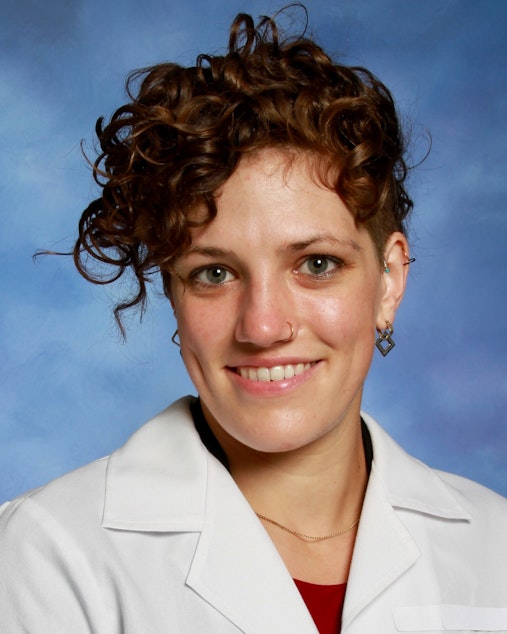Health care providers travel to WA for abortion training they can’t get at home

Tyler McChane is a medical resident in Idaho, training to become a family medicine doctor. He chose his program because of its focus on giving doctors the broad skills they’d need to work in rural hospitals and with underserved populations.
“Getting a strong foundation in addiction care, hepatitis C, and HIV” was important to him, McChane said, and “a big pull for me was having access to abortion training.”
McChane wants to be able to help patients who want an abortion, face pregnancy complications, or need medical attention for a miscarriage, he said. In any of those situations, he said, it’s the same, simple outpatient procedure.
“In an ideal world, you could fit that in just in your day-to-day clinic alongside routine visits for diabetes, or hypertension, or mental health,” he said.
Abortion training is a standard part of an OB/GYN residency — and something that aspiring family medicine doctors, nurse practitioners, and nurse midwives often seek out as well. Now, providers in training in Idaho and other states where abortion has become illegal are scrambling to get the abortion training they’d planned on. One workaround they’ve found is coming to Washington to learn.
Rachel Chisausky is in the same program as McChane. She wants abortion training because she sees herself practicing medicine in a rural area where there aren’t many specialists around, she said.
“If I’m on my own somewhere that’s, you know, a helicopter ride away from a bigger hospital, and somebody comes in with a miscarriage and profusely bleeding, and you need to act now, that’s a skill that I need to have,” she said.

Now, Chisausky and McChane are in the same situation.
Before the U.S. Supreme Court overturned the decision in Roe v. Wade guaranteeing the right to an abortion, Chisausky and McChane spent a full day every month or two just doing surgical abortions. It takes medical residents many days of training to get enough practice to feel confident and competent to manage any potential complications.
But now that abortion is illegal in Idaho, they can no longer get abortion training there.
Chisausky is a year ahead of McChane and will be finishing her residency in July. So, over the past eight months, she’s been traveling to Washington state to continue her training. That’s meant working out a lot of logistics.
“It’s going up the night before — so organizing flights, organizing lodging,” she said.
She’s had some help paying for travel but has had to foot much of the bill herself.
For their part, the clinics training out-of-state residents must make sure they are properly licensed and insured to practice in Washington.
And they were already pretty maxed out on how many residents they could train to do surgical abortions, prior to Roe being overturned.
“There’s only so many spots to go around,” said Dr. Erin Berry, the Planned Parenthood medical director for most of Western Washington. “But the requests from residents and advanced practice clinicians have only increased.”
The number of surgical abortions has been decreasing over time, Berry explained, because of access to contraception and an increase in abortions done using the medications Mifepristone and Misoprostol.
In Washington state, not only physicians but also nurse practitioners, nurse midwives, and physician assistants can perform surgical abortions during the first trimester — and all those providers are competing for the same, shrinking pool of training slots at Planned Parenthood and similar clinics to learn.
The end of Roe has thrown gasoline on an existing problem, Berry said. Now that there are many states where no surgical abortions are happening at all, medical providers who were counting on abortion training in those places have to travel to states like Washington to learn.
To make room for the influx, Western Washington Planned Parenthoods are prioritizing which local residents to train.
Instead of giving almost all family medicine residents training, Berry said, “We're trying to really have the residency programs take a look at: What is the resident’s end goal for what they want to do? Do they want to be sports medicine? Do they want to do abortion care in their practice?”
The end result, Berry said, is that, nationwide, fewer medical residents are going to get abortion training, and programs that offer that training are going to become even more competitive.
One faculty member at a residency program in a state where abortion is now illegal told KUOW that abortion training had been a big draw for his program — and now he’s not sure if they’ll even be able to fill their incoming resident class this year.
He asked KUOW not to use his name or the name of his program because they get funding from the state. He said none of that money ever went toward abortion training — but he nonetheless worries that if it came to the attention of state legislators that some residents learn how to do abortions, they would threaten to pull the funding.
Abortion training, historically, has attracted what he called “high-quality” family medicine residents to the program.
“It’s very common on the interview trail for residents to ask what type of procedures programs offer,” he said. “As we’ve been going through interviews this year, it’s been a major concern of our applicants.”
If you don’t learn how to do a procedure during residency, it can be really difficult to get that training afterwards, he said.
In an effort to address the training gap for health care providers who have finished most of their training, UW Medicine is starting a new program to help nurse practitioners and nurse midwives get abortion training, even if they’re already practicing. The program is supposed to start this fall, with a cohort of 15 students from Washington and other states.
Those students will also need to find space in the same pool of training slots, but the program director, Meghan Eagen-Torrko, said she thinks it won’t take very many days of training for experienced nurse practitioners and nurse midwives — some of whom have placed hundreds of IUDs over the course of their careers — to become comfortable doing uterine aspirations.
Eagen-Torkko said she thinks it's especially important for clinics to train nurses to perform abortions, since they — especially nurse-midwives — often see pregnant people more frequently than other providers.
Back in Idaho, Tyler McChane is about halfway through his residency. He hasn’t managed to get any abortion training since it became illegal there, and he’s not sure whether he would have chosen this program had he known it would be so difficult to get that training.
“It’s going to be hard to recruit trainees to the state of Idaho and other states that have these bans,” he said. “And a lot of these states, they’re depending on trainees to stay and become like the backbone of the physician workforce here.”
McChane said the health care restrictions in Idaho have made him rethink whether he wants to stay there after his residency is over.
“I’m from Kentucky,” he said. “I don’t want to just … abandon people in states like Idaho and Kentucky who need health care, just because politicians in power have made it illegal for me to practice here.”
Idaho might end up with fewer physicians in the wake of Roe’s reversal.
But also, patients everywhere will be less likely to have a doctor who knows how to perform an abortion, or manage a miscarriage.




